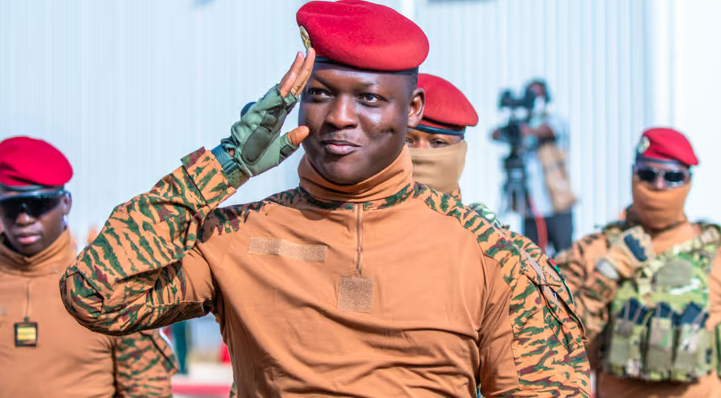Captain Ibrahim Traoré, born on March 14, 1988, in Bondokuy, Burkina Faso, is the country’s interim president since October 2022. At 36, he is currently the world’s youngest serving head of state.
Early Life and Military Career
Traoré pursued his education in Bobo-Dioulasso and later at the University of Ouagadougou, where he earned a degree in geology in 2010. During his university years, he was active in student organizations, including the Marxist-inspired National Association of Students of Burkina (ANEB) and the Muslim Students Association.
In 2010, he joined the Burkinabé army and trained at the Georges Namoano Military Academy. Rising through the ranks, he became a captain in 2020. Traoré was notably involved in anti-terrorism operations, particularly in the northern regions, and led the elite “Cobra” special forces unit.
Rise to Power
On September 30, 2022, Traoré led a coup that ousted interim president Paul-Henri Sandaogo Damiba. The move was driven by dissatisfaction with Damiba’s handling of the jihadist insurgency and perceived reluctance to diversify international partnerships beyond France. Following the coup, Traoré was declared head of the Patriotic Movement for Safeguard and Restoration (MPSR) and was officially sworn in as transitional president on October 21, 2022.
Governance and Policies
Traoré has positioned himself in the ideological tradition of Thomas Sankara, emphasizing anti-imperialism and pan-Africanism. Under his leadership, Burkina Faso has shifted its foreign alliances, distancing itself from former colonial power France and strengthening ties with Russia. This realignment includes security collaborations, notably involving Russian military support.
In September 2023, Burkina Faso, alongside Mali and Niger, formed the Alliance of Sahel States, aiming to bolster regional security and reduce Western influence. The alliance is also exploring the creation of a new currency to replace the CFA franc, a vestige of colonial economic structures.
Challenges and Controversies
Despite initial public support, Traoré’s administration faces significant challenges. The jihadist insurgency persists, with attacks causing substantial civilian casualties and displacing over 2.1 million people. A notable incident occurred in August 2024, when at least 100 civilians were killed in Barsalogho during an attack attributed to jihadist groups.
In response to the ongoing insecurity, Traoré extended the transitional government’s mandate by five years in May 2024, postponing promised elections. This decision has drawn criticism from international observers and human rights organizations, which have also raised concerns about censorship and alleged abuses by security forces.
Public Perception
Traoré maintains a strong support base, particularly among youth and pan-Africanist groups, who view him as a symbol of resistance against foreign exploitation and a proponent of African unity. His leadership style and policies continue to evoke comparisons to Sankara, reflecting a desire for a new direction in Burkina Faso’s governance.
How Ibrahim Traoré is transforming Burkina Faso
Since assuming power in September 2022, Captain Ibrahim Traoré has implemented a series of reforms aimed at bolstering Burkina Faso’s economic independence, infrastructure, and cultural identity. Here’s an overview of the key improvements under his leadership:
Economic and Industrial Reforms
- GDP Growth and Fiscal Policies: Under Traoré’s leadership, Burkina Faso’s GDP increased from approximately $18.8 billion to $22.1 billion. He rejected loans from the International Monetary Fund (IMF) and the World Bank, emphasizing economic sovereignty. Additionally, he reduced salaries of ministers and parliamentarians by 30% and increased civil servants’ salaries by 50% .
- Agricultural Advancements: The government distributed over 400 tractors, 239 tillers, 710 motor pumps, and 714 motorcycles to support farmers. These efforts led to increased production: tomato yields rose from 315,000 metric tonnes in 2022 to 360,000 in 2024; millet from 907,000 to 1.1 million metric tonnes; and rice from 280,000 to 326,000 metric tonnes .
- Industrial Development: Traoré’s administration established the country’s first two tomato processing plants and a second cotton processing facility. A state-of-the-art gold mine was inaugurated in 2023, and the export of unrefined gold to Europe was halted to promote local processing .
Infrastructure and Energy Initiatives
- Transportation Projects: The government is constructing and upgrading roads, including the near completion of the Northern Interchange in Ouagadougou. The Ouagadougou-Donsin Airport, expected to handle 1 million passengers annually, is slated for completion in 2025 .
- Rural Electrification: A new strategy aims to increase rural electrification rates to 50% by 2028, addressing disparities between urban and rural areas and promoting economic development .
Security Measures
- Counterterrorism Efforts: Traoré established a special rapid intervention brigade to combat insurgency. The use of Turkish drones, such as Bayraktar TB2 and Akinci, has been intensified to track jihadist groups .
- Stabilization Progress: Approximately 343,000 internally displaced persons have returned to their homes, indicating progress in stabilizing conflict-affected areas .
Social and Cultural Reforms
- Education Initiatives: The government launched the Postal Bank of Burkina Faso with a capital of $25.1 million to improve banking infrastructure. Additionally, a Science High School Construction Program established a high school in each of the country’s 13 regions, promoting equal educational opportunities .
- Judicial Reforms: In a move to decolonize the judiciary, British-style legal wigs and gowns were banned in courts, replaced by traditional Burkinabé attire. This change reflects a broader effort to reinforce national identity and cultural pride .
Justice and Human Rights
- Prison Reforms: Over 1,000 inmates received pardons to alleviate overcrowding. Plans were announced to establish military correctional facilities to improve detention standards .
- Capital Punishment Debate: The government is considering reinstating the death penalty, abolished in 2018, as part of broader legal reforms. This proposal has sparked debate among human rights organizations .
These initiatives reflect President Traoré’s commitment to fostering economic growth, enhancing infrastructure, and promoting cultural identity in Burkina Faso.

